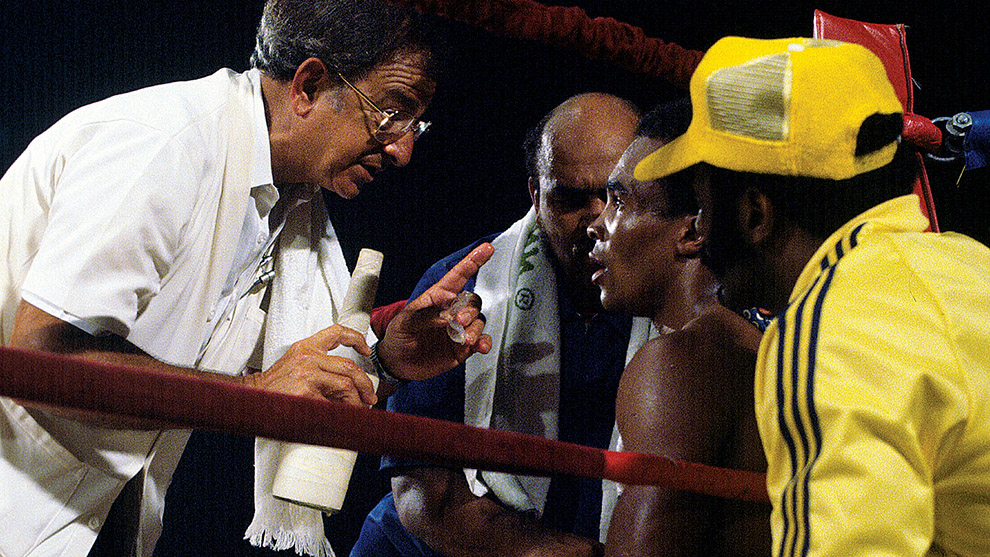MANNY STEWARD studied form all the time and that is because he was from a distant side of the sport, where knowing all the details was the difference between a State champion and a kid crying in the back of a car.
It was Manny, many years later, who cooked and prepared food in suites in Atlantic City hotels when he was getting the same kids from the Kronk’s amateur system ready for fights; same mentality, same detail, just more money. The kids were fighting under brighter lights, but he was still studying form.
That is part of what a trainer does.
Last Friday, at York Hall, Martin Bowers met Chris Bourke at the end of the first round; it had not been a good round for Bourke, his first for 11 months, and he never looked right. Bowers knows Bourke, likes Bourke and works with him in the gym.
On Friday, Bowers stopped Bourke before he sat down, he looked closely at him and said something in his ear. I’m guessing it was personal and I’m guessing at that exact moment, Bowers wanted to know if Bourke was good and ready to continue? From my seat, I was not sure. Bowers wanted to know. He obviously got the answer he needed; Bourke won in round three.
That is part of what a trainer does.
Martin Bowers and Chris Bourke
Angelo Dundee was the trainer’s trainer in many ways. He was an expert at pushing the right buttons at the right time and a swirling marvel during the 50 seconds that he got to make and break careers in the corner.
It was Dundee in his finest minute that got in Sugar Ray Leonard’s ear at the end of round twelve against Tommy Hearns in their first fight. His guy, as sweet Ang would say, was letting the fight slide away. Dundee gave him hell in the corner and that could have backfired. Dundee screamed and slapped Leonard’s thighs: “You’re blowing it, son. Don’t fight at his tempo, if you don’t pick up your tempo, you’re going to blow it,” Sugar was down on all cards. Sugar listened and stopped Hearns in round 14.
Leonard knew exactly what Dundee had done that night and tells the tale with style. “Then it came, the spark I needed, from the voice of Angelo Dundee. At roughly 8:30pm on Wednesday, September 16, 1981, Angelo came to my rescue and for that I will always be grateful.”
That is part of what a trainer does.
Boxing trainers need to know the opposition, they need to know what questions to ask, they need to know what to say in the darkest of moments and, very importantly, they need to know when to intervene and save their boxer. Not all of them, but the good ones.
One day in Manila, at the end of 14 of the greatest rounds in history, Eddie Futch secured his place in boxing folklore when he climbed through the ropes to face Joe Frazier. It was the third and most savage of fights between Frazier and Muhammad Ali. The greatest of fights.
The clock said that Frazier had three minutes left to finish the 15 rounds on his feet. Ali was close to collapse. Futch took a breath and a long, hard look at his boxer. The seconds on the clock ticked – boxing history was being made and the world was watching.
Futch leant in, his words private between his lips and Frazier’s ears. It was unforgettable. Ali was winning on all three cards.
“I’m going to stop it, Joe. The fight’s over.” That is what Futch remembers saying. He also remembers that Frazier never once complained. Frazier did try to stand in the corner, but Eddie tapped him on the shoulder. “Sit down. The fight’s over. This is the best thing to do.”
Futch, in the Hollywood version, might also have said: “Sit down, son. It’s all over. No one will ever forget what you did here today.” Those words are just brilliant.
It was stopped seconds before the bell for the last round. What drama, it’s hard to imagine.
The men in the corner are just human. During the last few weekends, I have witnessed at ringside a lot of trainers who I would ban for their incompetence. In New York, at the Amanda Serrano fight, there were a lot of dangerous fools in charge of boxers. Too many. We have also seen, over the last two or three years, a lot of images and films of private sparring sessions where so-called trainers have applauded the one-sided beatings. Ask yourself, would you be happy with your child in the care of a man who applauds his fighter knocking out somebody in the gym? Would you?
In British rings, I have seen men with nowhere near enough experience take control of fighters in serious fights. They do not have the ring knowledge or the guts to do what Ben Davison did last Saturday. They also do not know enough to hire for the night a cutsman with skills and the necessary knowledge.
Adam Booth, a decent man with a life of boxing experience, got it right when he talked about the dangers of being a brave fighter, but the even greater danger of being a brave trainer. That is the truth.
As expected, there were critics of Davison’s timing last Saturday, pointing out that there were less than ten seconds of the round remaining. I go back to Futch once again. People told him that Frazier only had three minutes to survive. This is what Eddie would tell them: “I’m not a timekeeper, I’m a handler of fighters.” That is the simple truth.
Leigh Wood and Ben Davison (Mark Robinson Matchroom Boxing)
